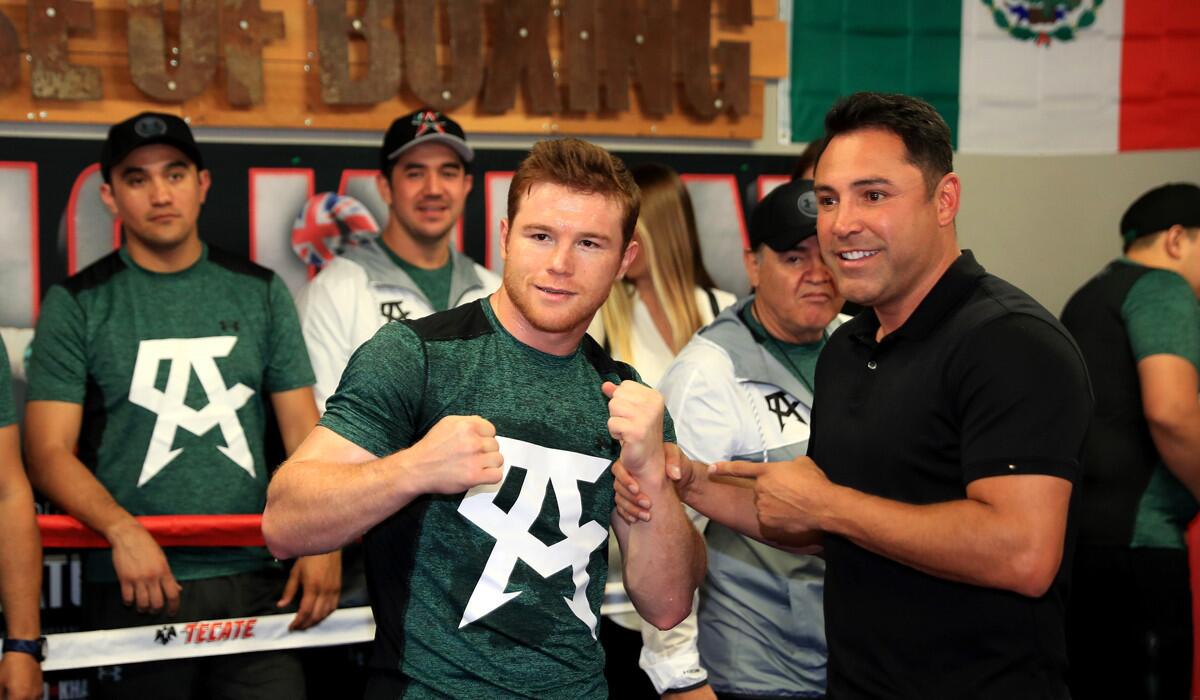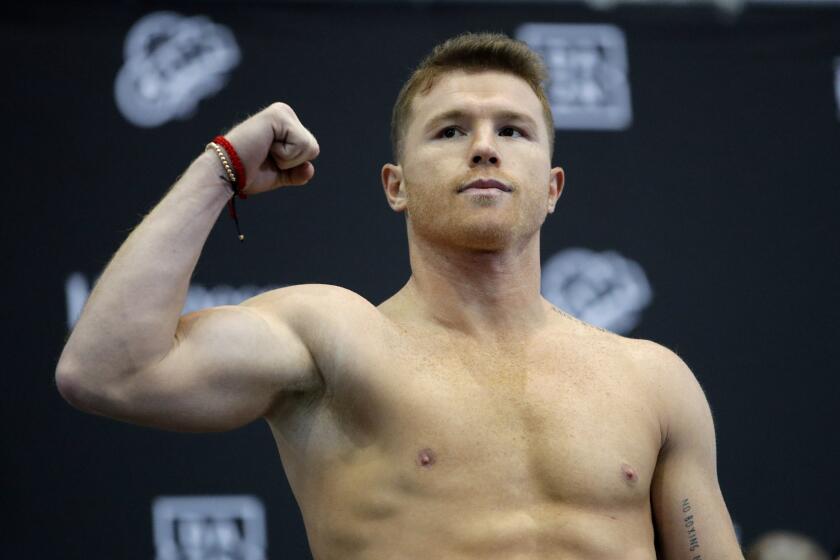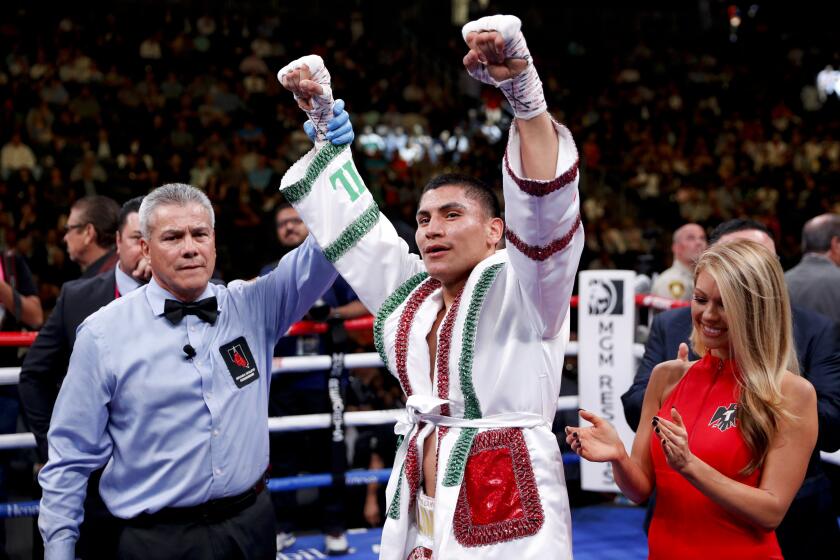Canelo Alvarez’s fight plan should look familiar

- Share via
Pay him — or else.
That’s the implied threat in the lawsuit that Canelo Alvarez filed this week against promoter Oscar De La Hoya and Golden Boy Promotions, as well as streaming broadcast partner DAZN.
In addition to more than $280 million in damages, Alvarez is asking for the freedom to fight on shows promoted by entities other than Golden Boy and broadcast by companies other than DAZN.
In essence, he’s demanding control over his career.
Similar to how De La Hoya did.
Ironically, De La Hoya was the fighter who fundamentally changed the power dynamic between box-office champions and the companies that stage their fights.
Twenty years ago, De La Hoya sued Bob Arum to break his promotional contact with Top Rank. He won.
The two sides briefly reconciled, but De La Hoya eventually made their split permanent when he became his own promoter.
Canelo Alvarez sued his promoter, Oscar De La Hoya and Golden Boy Promotions, and streaming broadcast partner, DAZN, for breach of contract and fraud.
The fighter was now the boss, a mind-set adopted by Floyd Mayweather Jr., who succeeded De La Hoya as the sport’s top attraction.
Mayweather once paid $750,000 to break his contract with Top Rank.
Mayweather continued working with promoters, but under his terms. He didn’t work for the promoter. The promoter worked for him. Mayweather absorbed more risk. He also gained more upside.
So, if history was a guide, Alvarez was bound to try to venture out on his own.
What prevented this from happening earlier was the record-breaking offer he received from Golden Boy, an 11-fight deal for $365 million. The contract stipulated Golden Boy would pay Alvarez $15 million to take on 168-pound champion Rocky Fielding and $30 million per fight thereafter.
Golden Boy had a separate contract with DAZN, which agreed to pay it a $20-million licensing fee for every card that was headlined by Alvarez.
In his complaint, Alvarez said he was unaware that DAZN signed its deal with Golden Boy under the assumption the promotion company would deliver a fight between him and Gennady Golovkin. Alvarez’s deal with Golden Boy included no such stipulation. In fact, Alvarez said in his court filing that Golden Boy was obligated to pay him an additional
$25 million if he agreed to take on Golovkin.
Alvarez and Golovkin fought twice on HBO’s pay-per-view arm. Both fights generated well over a million pay-per-view buys.
The only Alvarez fight that sold better was his loss to Mayweather.
A subscription service, DAZN figured it could increase its customer base by streaming a third fight between Alvarez and Golovkin. DAZN was invested enough in the plan to sign Golovkin to a separate $100-million contract.
Canelo Alvarez filed a complaint against is promoter, Oscar De La Hoya and Golden Boy Promotions, and streaming broadcast partner, DAZN.
Alvarez fought twice on DAZN in 2019, defeating Daniel Jacobs and Sergey Kovalev. Not until he showed an interest in fighting Kovalev was Alvarez made aware that DAZN was displeased with his choice of opponents, according to his complaint. Alvarez said he didn’t know DAZN had the right to reject his opponents based on the terms of its deal with Golden Boy.
DAZN accepted Jacobs and Kovalev, but no more. If Golden Boy couldn’t produce a Golovkin fight, DAZN wouldn’t pay the $40-million licensing fee — and it hasn’t. Alvarez hasn’t fought this year.
Who knows if the relationships are salvageable? In retrospect, it has become evident that DAZN overpaid for boxing in a desperate attempt to gain a foothold in the U.S. market. It’s also become clear that Alvarez doesn’t trust De La Hoya or Golden Boy.
Young fighters such as Vergil Ortiz Jr. have missed out on chances to raise their profiles, while top star Canelo Alvarez might be further sidelined.
If the three-way partnership falls apart, the question is what will come next.
When De La Hoya became his own promoter, he fought less but made sure his fights were cultural events by having them on Cinco de Mayo and Mexican Independence Day.
Mayweather adopted a particularly unlikable public persona, figuring it made no difference to him whether fans paid to watch him lose.
In the cases of De La Hoya and Mayweather, they had visions for their careers. They also received the advice necessary to execute their plans, De La Hoya from Richard Schaefer and Mayweather from Al Haymon. And when they triumphed, boxing triumphed.
The sport hasn’t enjoyed many victories lately. More than ever, boxing needs the kind of vision that De La Hoya and Mayweather provided.
Alvarez could deliver that if he becomes a promotional free agent, in which case this legal mess would benefit
not only him, but the entire
sport.
More to Read
Go beyond the scoreboard
Get the latest on L.A.'s teams in the daily Sports Report newsletter.
You may occasionally receive promotional content from the Los Angeles Times.













